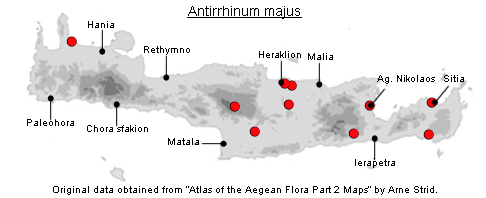SPECIES DESCRIPTION
ANTIRRHINUM MAJUS
Family and Genus:- See- PLANTAGINACEAE
Common Name:- Snapdragon
Homotypic Synonyms:- Antirrhinum majus var. angustifolium, Antirrhinum
majus var. tortuosum
Meaning:- Antirrhinum (Gr) Nose-like.
Majus (L) Larger, greater, bigger.
General description:- Variable medium to tall perennial, to 1.5m in robust
specimens.
Stems:-
1) Up to 150(-200) cm. ascending to erect, branched, especially below, glabrous or
sometimes glandular-hairy in the inflorescence.
Leaves:-
1) 10-60 x 1-5(-10) mm, linear to linear-oblong, (1½-)2-12 times as long as wide,
distinctly cuneate at the base, the uppermost often opposite.
Flowers:-
1) Pink or purple, with a yellow or occasionally white palate, or all pale yellow,
large, 30-45 mm long, fragrant.
1) Bilaterally symmetric in a terminal spike-like inflorescence in which the individual
flowers are pedicellate.
2) Petals, form a broad swollen tube pouched at the base, the edge is two-lipped,
a) upper, being up-curved divided into two almost to the base.
b) lower, curved down and 3-lobed.
Habitat:- Gorges, road embankments, archaeological sites, stone walls, ruderal
habitats. 0-600 m. mainly around anthropogenic environments
Distribution:- Probably native to SW Europe, widely naturalised in Greece and
elsewhere in the Mediterranean region. Very limited distribution on Crete, but
perhaps seriously under recorded.
Flowering time:- Apr-June and occasionally at other times.
Photos by:- Steve Lenton
